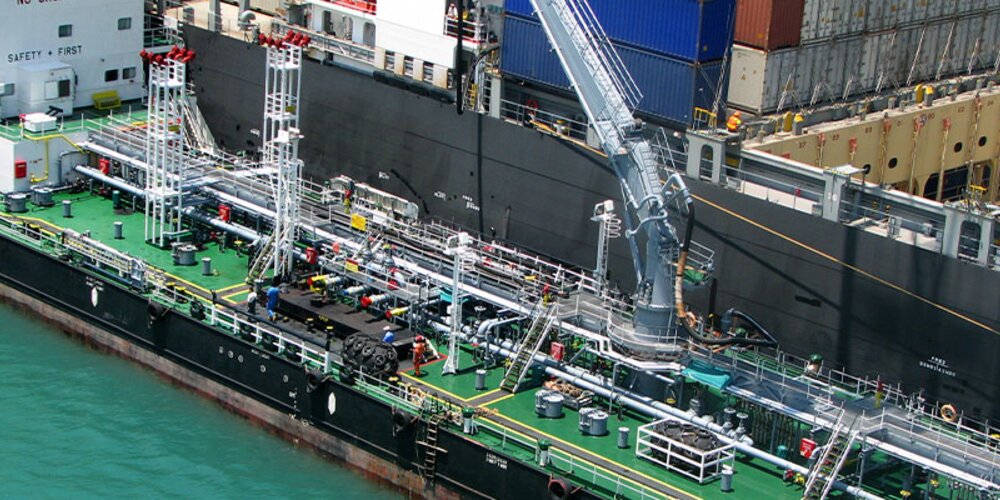Browse our services
Explore how Brookes Bell can help you
Find an expert
Meet our team, find and expert and connect
Contact us
Get in touch, we're here to help

Bunker fuel quality has become increasingly significant, especially since the implementation of stricter sulphur regulations in 2020. These regulations reduced the permissible sulphur content in marine fuels from 3.5% to 0.5%, prompting many suppliers to blend different stocks to meet the new standards. This practice, however, has led to inconsistencies in fuel quality and the introduction of potentially harmful substances.
The significance of bunker fuel quality extends beyond regulatory compliance. High-quality fuel is essential for the efficient operation of ship engines and the longevity of critical machinery. Poor-quality fuel can lead to a range of issues, from minor inconveniences to severe operational disruptions, such as blockages in filters leading to engine failures. Additionally, the presence of substances like chlorinated hydrocarbons can result in corrosive damage, significantly increasing maintenance costs and downtime.
Fuel quality also has environmental implications. The maritime industry is a significant contributor to global emissions, and using cleaner, high-quality fuels helps reduce the environmental impact. Low-quality fuels can produce higher levels of pollutants, including sulphur oxides (SOx), nitrogen oxides (NOx), and particulate matter, which have detrimental effects on air quality and public health, something that is particularly poignant for a vessel when it is berthed.
Moreover, the financial implications of poor fuel quality are substantial. The cost of engine repairs, downtime, and the potential for increased fuel consumption due to inefficiencies can add up quickly. In extreme cases, fuel-related issues can lead to catastrophic engine failures, necessitating expensive emergency interventions. Shipping companies must also consider the reputational risk associated with fuel-related incidents, as such events can lead to delays, contractual penalties, and loss of client trust.
From an operational perspective, reliable fuel quality testing and certification are crucial for the smooth functioning of maritime logistics. Ships operate under tight schedules, and any delay caused by fuel problems can disrupt supply chains, affecting businesses and consumers alike. Regular fuel quality assessments, therefore, play a vital role in maintaining the reliability and punctuality of maritime transport services.
Advanced Analytical Techniques
Routine testing, as set out in ISO 8217, identifies the physical properties of the fuel. However, it is sometimes necessary to perform more in-depth analysis to examine the chemical composition of the fuel using advanced analytical techniques such as Gas Chromatography-Mass Spectrometry (GC-MS) and Fourier Transform Infrared Spectroscopy (FT-IR). GC-MS involves separating complex mixtures into their individual components using gas chromatography, followed by mass spectrometry to identify these components. FT-IR can be utilised to identify the presence of chemical ‘functional groups’ present in the material under test, such as the carbonyl (C=O) group, which may not ordinarily appear in the GC-MS spectra of unadulterated fuel samples.
"GC-MS is an analytical technique, like a forensic way of looking at fuel. Routine testing can provide quick assessments of fuel samples, checking for basic physical properties to ensure its up to spec and meets fuel standards," notes Bronwen Carey, Fuel Chemist at Brookes Bell. "However, when these fuels show unusual results or cause operational issues, more in-depth analysis may be required.
Fuel should primarily consist of hydrocarbons, compounds made up of only carbon and hydrogen. However, in some cases, oxygenates and other unwanted substances may be present in fuels which could potentially result in damage to machinery.”
ISO 8217: The latest standards revisions
ISO 8217:2024 marks a significant overhaul of the longstanding marine fuel standard, spurred by increasingly stringent pollution regulations, particularly the IMO 2020 rules targeting emissions reduction. This update extends the scope of fuel types covered, notably embracing biofuels alongside traditional fossil fuels. Moreover, it also introduces a more refined organisational structure, with specifications categorised into four distinct tables to better accommodate the diverse range of fuels utilised in maritime operations. These changes reflect a concerted effort to align with evolving industry practices and environmental priorities, ensuring that marine fuels meet the necessary quality and sustainability standards.
Central to this update is the crucial role of bunker fuel quality, setting out comprehensive requirements and testing procedures to assess the quality and compatibility of bunker fuels. By incorporating biofuels and refining specifications, the updated standard not only enhances fuel performance but also facilitates the industry's transition towards more sustainable and environmentally friendly fuel options. This emphasis on bunker fuel quality underscores the importance of ensuring that marine fuels meet stringent regulatory requirements while supporting the long-term sustainability goals of the industry.
“Given the ubiquitous use of bunkers throughout the global maritime industry, this has been a standard of pivotal importance,” explains Michael Banning, Managing Marine Engineer and Fuel Specialist at Brookes Bell. “ISO 8217 has been the definitive international standard for bunker fuel specifications since 1987, and since the standard’s initial introduction, the regulatory environment has changed drastically, with transnational bodies such as the IMO setting ambitious standards for the reduction of greenhouse gas emissions from shipping,” he added.
Brookes Bell's commitment to high standards of fuel analysis and quality assurance is critical. Our expertise ensures that the fuel used in ships not only complies with regulatory standards but also supports the operational efficiency, safety, and environmental sustainability of the maritime industry. As the marine fuel landscape evolves with new and alternative energy sources, the importance of maintaining stringent quality control measures cannot be overstated.